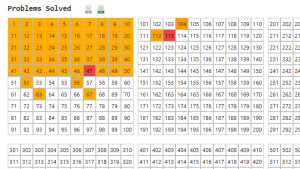Took me a while to write about this, but I really love Project Euler. The page is a collection of math challenges, which require some programming (I saw just one which could have been computed by a closed formula without any help). The first ten are quite easy to solve and are more commonly known math problems. Prime numbers and combinatorics play a strong role. But then the difficulty rises quite quickly. Usually it takes me one to two hours to write a Python solution for one. If I would – like I should – write unit-tests for each single method and not for a few selected one, then I guess 50% more.
It’s great: each problem is a closed, separate problem, which requires some algorithmic thinking and – of course – some proper implementation. If you chose the wrong path time or space complexity will kill your ambitions quite quickly. But proper solutions are computed most of the time in less than a minute.
Most of the time I rely on basic python structures and common libraries. But I’ve also given NumPy, itertools, etc. a try. Speeds up the process quite a bit.
 My next goal is to fix problem 47, because then I’ve handed in solutions for all of the first fifty problems.
My next goal is to fix problem 47, because then I’ve handed in solutions for all of the first fifty problems.

 The highest challenge (with also the highest difficulty level (for me) so far) was problem 668. Due to a really big (80 GiByte!) boolean array the computer had a hard time swapping memory. So it took almost 36 hours to finish. By the way: less than 900 people worldwide have solved this issue #tinyflakeofpride
The highest challenge (with also the highest difficulty level (for me) so far) was problem 668. Due to a really big (80 GiByte!) boolean array the computer had a hard time swapping memory. So it took almost 36 hours to finish. By the way: less than 900 people worldwide have solved this issue #tinyflakeofpride
 Of course, several geniuses have dedicated pages to optimal solution strategies. Which is a nice idea. But I avoid them. Most of the times stepping back, thinking without a display about the problem and if the chosen approach was a good one, is more helpful. A solution by cheating is nothing which renders any reward.
Of course, several geniuses have dedicated pages to optimal solution strategies. Which is a nice idea. But I avoid them. Most of the times stepping back, thinking without a display about the problem and if the chosen approach was a good one, is more helpful. A solution by cheating is nothing which renders any reward.